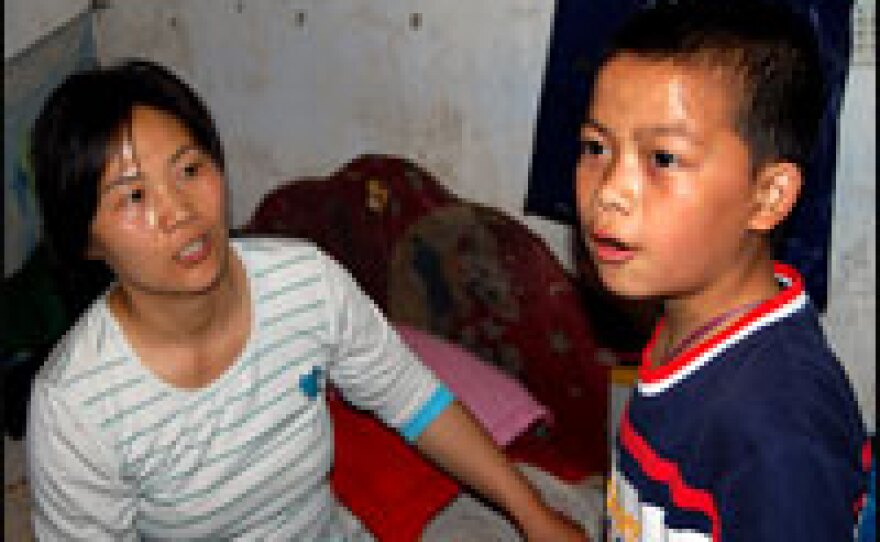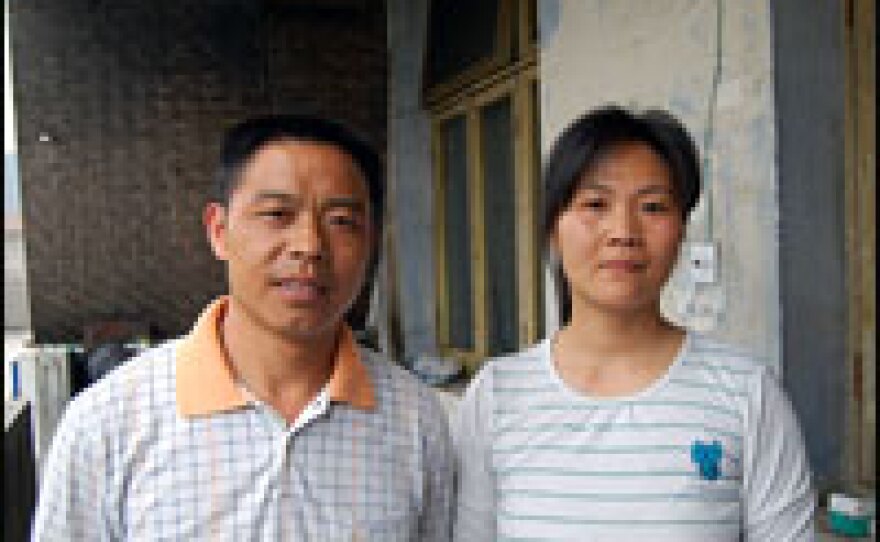

The Third Ring Road around Chengdu, China, completed in 2002, is the latest attempt to encircle this ever-expanding city.
The countryside 30 miles to the north of Chengdu saw massive destruction and loss of life from the May 12 earthquake. In the city, everyone was shaken, but the damage was mild.
In a three-part series, NPR's Robert Siegel offers glimpses of life in Chengdu as it returns to normal and as it is experienced by people who have one thing in common: They all live near an outer orbit of urban life here — the Third Ring Road. The road encircles Chengdu about five miles from the city center.
Part 1 profiled Lei Lei, a 26-year-old English teacher and expectant mother who recently bought a brand new apartment with her husband, Jason; they plan to move into it this fall.
Part 2 introduces another couple, who dreamed of an apartment like the one Lei Lei bought but has had to settle for much less.
The City of Disappointments
One neighborhood near the road is a warren of two-story houses. Each has a courtyard. A half-dozen families who have a bedroom or two each share one courtyard. They also share a bathroom. In such cramped quarters, they share much else.
Everyone's laundry hangs in public. One neighbor's pet parakeets sing for everyone. Everyone hears the sizzle of another neighbor's supper on an outdoor stove.
This is where 11-year-old Lin Bo is growing up. He's learning English at school.
Robert Siegel met Lin Bo through his aunt and uncle, who live in only slightly more commodious circumstances a block away. Lin Bo's aunt is named Yi Bin. His uncle is Cai Zisheng.
They are envious of their nephew's progress with English. Their own son lives with his grandparents in the rural village they came from; it's near the town of Neijiang, about 70 miles southeast of Chengdu. They say the school their son attends isn't as good as his cousin's school in Chengdu.
"The schools there cannot compare with the schools in the cities," Cai Zisheng says. "We lived in a village that's surrounded by big mountains. Where we were, you really can't make a cent. You know, you raise a little livestock, some crops, but that's really not sufficient."
Yi Bin and Cai Zisheng live in a second-story room, 10 feet by 10 feet, in a converted warehouse. There's a second room, about one-third as big, where they keep a television set, and a kitchen — with a single-burner, coal-burning stove — on the balcony. The shower and toilet downstairs are shared by four families. They and their neighbors in Chengdu are among the hundreds of millions of Chinese who in their lifetime have left a rural farming village for a shot at life in the city.
"Originally, we wanted to buy an apartment, but we can't afford it, for sure," Yi Bin says, adding, "I thought that we could make some money and bring my parents here and have my kids here, so they could get the same kind of education the city kids get. But now, I don't know how long it would take to get there."
Cai Zisheng says that dream seems out of reach financially. "Based on the kind of money we make, as laborers, it would be something out of One Thousand and One Arabian Nights. An apartment in Chengdu would cost 300,000 or 400,000 yuan."
Cai Zisheng makes 2,000 yuan a month driving a cement truck. His wife makes 600 yuan as a housekeeper.
The couple's financial troubles stem, in part, from a truck accident that left them with major debt.
The Accident
The couple came from a mountain village in Sichuan province. Cai Zisheng was a carpenter with ambition. He became a truck driver, got a van and headed for Chengdu. Soon, his wife joined him. They borrowed money from friends and from the bank and bought a bigger truck. Both of them drove; business was good.
Then came the accident. Yi Bin was in the truck; it was totaled. She hit her head and was hospitalized. The accident left her with a facial tic, which is more evident to her than to anyone else. And it left the couple with big expenses: the 20 percent deductibles on their health and auto insurance and payments on the loans they took out.
And then there are the school fees and living expenses for their 17-year-old daughter, who is at a public boarding school.
"We talk to her on the phone once a week," Cai Zisheng says. "We tell her to study hard and it will help to her change her destiny the way we couldn't, and leave behind the impoverished life of the village."
Cai Zisheng and Yi Bin have two children. Under China's one-child policy, they had to pay a fine when their 11-year-old son was born. He used to live with them in Chengdu, but they can't care for him now, so he's back in the village. Three of his old study sheets from kindergarten are still hanging on the wall: the numbers, the animals and the sounds of the Latin alphabet. Not having him with them, they say, hurts.
As hard as their urban experience has been, they express no sense of grievance. Life in China is fair, they say.
"Yes, it's pretty fair, because we're not educated," Yi Bin says. "And these days, anything you do, you need an education."
"Yes, we're not educated, so we can only do the kind of work we do," Cai Zisheng says. "It's not a punishment. It's fair."
A few days after the earthquake, Cai Zisheng and Yi Bin were all right. But back in their home village, far as it is from the epicenter, the quake did some property damage to the family's house, which Cai Zisheng built.
"Nobody got hurt," Cai Zisheng says. "It was daytime. My parents were working in the hills. But a lot of the roof tiles came off. For the first few days, we couldn't get in touch with them."
Everyone is well.
When Cai Zisheng and Yi Bin moved to Chengdu, the area where they now live in was farmland. The Third Ring Road wasn't yet open.
Now, they suspect they only have a year or two before their migrant neighborhood is demolished, new apartment buildings go up, and they have to move once again.
Copyright 2022 NPR. To see more, visit https://www.npr.org. 9(MDAzMjM2NDYzMDEyMzc1Njk5NjAxNzY3OQ001))






